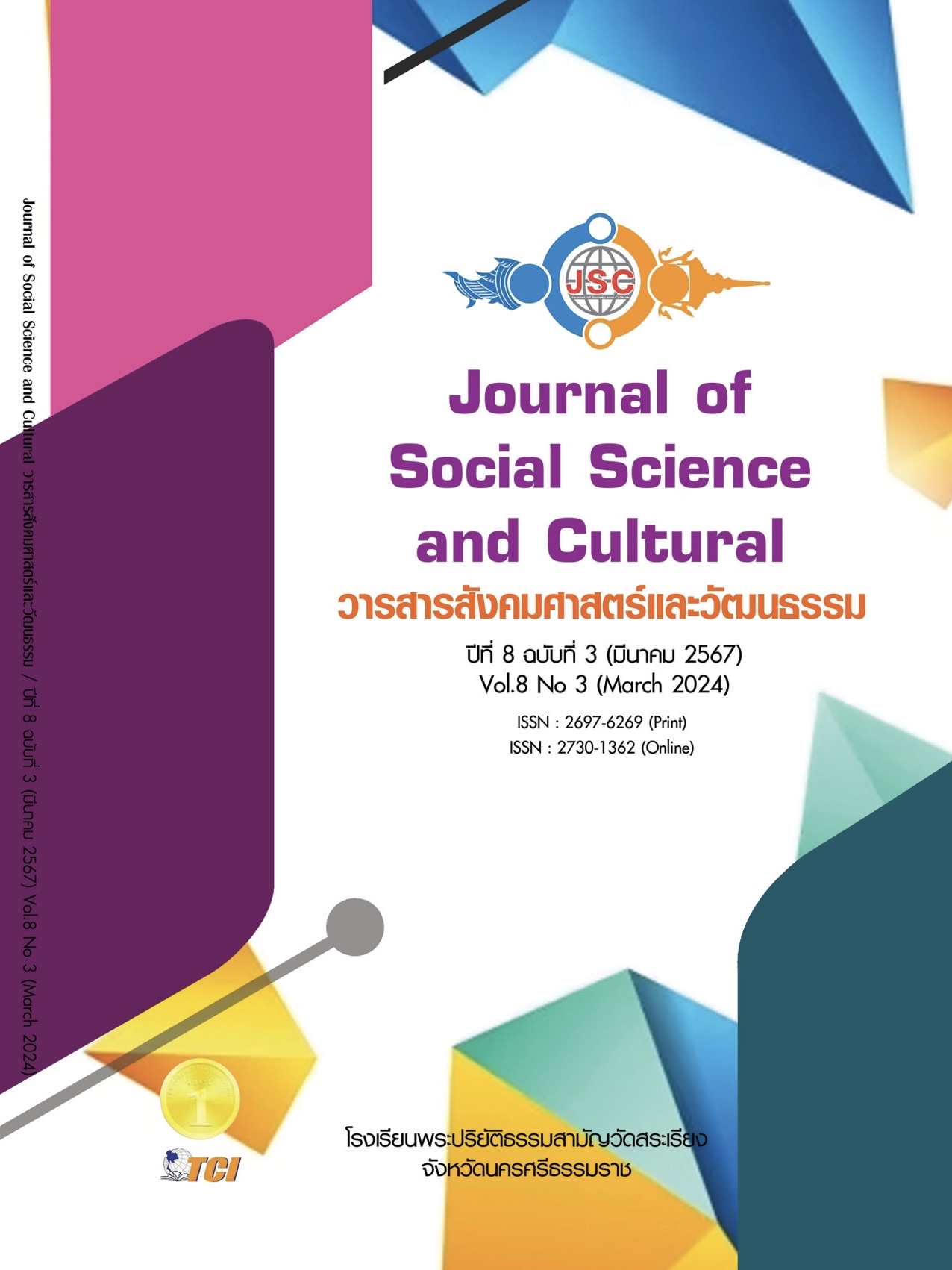THE DEVELOPMENT OF CURRICULUM TO ENHANCE ACTIVE LEARNING COMPETENCY ON ACTION RESEARCH PROCESS AND PROFESSIONAL LEARNING COMMUNITY FOR BASIC EDUCATION TEACHERS
Main Article Content
Abstract
This research article aims 1) to study necessary foundation data, 2) to construct and verifying the curriculums’ quality, 3) to implement the curriculum, and 4) to evaluate an enhanced curriculum. This research and development methodology involved four steps as follows: Step 1 is to study foundational data for curriculum development by surveying the conditions and requirements, studying relevant concepts and documents, and collecting data through interviews with scholars and experts. Step 2 is to construct and verifying the curriculums’ quality, conducting a pilot study. Subsequently, revising the curriculum and its manual. Step 3 is to implement the curriculum with 30 volunteer teachers at Anubanchun School (Ban Bua Sathan). And step 4 is to evaluate the curriculum. The results at each step were presented as follows: 1) Based on the foundational data findings, the developed curriculum should have content covering 7 topics, namely: 1.1) active learning strategies, 1.2) active learning techniques, 1.3) active learning design, 1.4) active learning lesson plan writing, 1.5) media and learning resources utilization, 1.6) creating conducive classroom environments, and 1.7) learning outcomes assessment from active learning approaches. 2) The enhanced curriculum comprises six components: Principles, Objectives, Structure and content, Process, Learning materials; and Assessment. The process involves five stages: situation analysis, planning, acting, observing, and reflecting on the outcomes. 3) Post-curriculum implementation, teachers' competencies in active learning management were higher than the criteria of 75 percent at the statistical significance level of .05. 4) Teachers’ opinion through input, process, and output of the enhanced curriculum was at a high level.
Article Details
References
กระทรวงศึกษาธิการ. (2566). นโยบายและจุดเน้นของกระทรวงศึกษาธิการ ประจำปีงบประมาณ พ.ศ. 2567. กรุงเทพมหานคร: สำนักงานปลัดกระทรวงศึกษาธิการ.
จีรพัส บทมาตย์ และคณะ. (2566). รูปแบบการพัฒนาหลักสูตรเสริมสร้างสมรรถนะตามมาตรฐานอาชีพแบบไตรภาคี. วารสารสันติศึกษาปริทรรศน์ มจร, 11(3), 1044-1055.
ประสาท เนืองเฉลิม. (2561). การวิจัยปฏิบัติการทางการเรียนการสอน. ขอนแก่น: คลังนานา.
ปิยธันว์ เบญจเทพรัศมี. (2560). การพัฒนาหลักสูตรเสริมสมรรถภาพการจัดการเรียนรู้แบบผสมผสานสำหรับครูคอมพิวเตอร์ เพื่อส่งเสริมการรู้เทคโนโลยีสารสนเทศและการสื่อสารของนักเรียนระดับประถมศึกษา. ใน ดุษฎีนิพนธ์การศึกษาดุษฎีบัณฑิต สาขาวิชาหลักสูตรและการสอน. มหาวิทยาลัยนเรศวร.
พศิน แตงจวง. (2554). รูปแบบการพัฒนาสมรรถนะบุคลากรทางการศึกษา. กรุงเทพมหานคร: ดวงกมล.
มนสิช สิทธิสมบูรณ์. (2565). กลยุทธ์การจัดการเรียนรู้เชิงรุก. พระนครศรีอยุธยา: โรงพิมพ์มหาจุฬาลงกรณ์มหาวิทยาลัย.
มารุต พัฒผล. (2554). การพัฒนาหลักสูตรฝึกอบรมครูเพื่อเสริมสร้างความสามารถในการจัดการเรียนรู้โดยใช้วิจัยเป็นฐาน. กรุงเทพมหานคร: มหาวิทยาลัยศรีนครินทรวิโรฒ.
วัชรา เล่าเรียนดี และคณะ. (2560). กลยุทธ์การจัดการเรียนรู้เชิงรุก เพื่อพัฒนาการคิดและยกระดับคุณภาพการศึกษา สำหรับศตวรรษที่ 21. นครปฐม: เพชรเกษมพริ้นติ้ง กรุ๊ป.
สำนักงานเลขาธิการสภาการศึกษา. (2563). สมรรถนะการศึกษาไทยในเวทีสากล ปี 2563 (IMD 2020). กรุงเทพมหานคร: 21 เซ็นจูรี่.
สำนักงานเลขาธิการสภาการศึกษา. (2564). รายงานการศึกษาการพัฒนาคุณภาพผู้เรียนจากผลการทดสอบ O-NET และ PISA. กรุงเทพมหานคร: 21 เซ็นจูรี่.
สืบสกุล นรินทรางกูร ณ อยุธยา. (2564). การบริหารทรัพยากรมนุษย์ทางการศึกษาแนวใหม่. กรุงเทพมหานคร: สำนักพิมพ์จุฬาลงกรณ์มหาวิทยาลัย.
DuFour, R. et al. (2008). Revisiting Professional Learning Communities at work. Bloomington, IN: Solution Tree Press.
Kemmis, S. (1988). Action Research. In Keeves, J.P. (ed). Educational Research Methodology and Measurement: An International Handbook. Oxford: Pergamon Press.
Mertler, C. A. (2018). Action Research Communities: Professional Learning, Empowerment Through Collaborative Action Research. London: Routledge.
Mezirow, J. (2003). Transformative Learning as Discourse. Journal of Transformative Education, 1(1), 58-63.
OECD. (2021). Teacher professional development. Retrieved January 12, 2024, from https://gpseducation.oecd.org/revieweducationpolicies/#!node=41732&filter=all
Papert, S. (1980). Mind Storms, Children, Computers and Powerful Ideas. New York: Basic Books.
Piaget, J. (1964). The Early Growth of Logic in the Child. London: Routledge and Kegan Paul.
Sagor, R. (2010). Collaborative Action Research for Professional Learning Communities. Bloomington, IN: Solution Tree.
Taba, H. (1962). Curriculum Development: Theory and Practice. New York: Horcourt, Brace & World.
Tyler, R. W. (1971). Basic Principles of Curriculum and Instruction. Chicago: The University of Chicago press.


